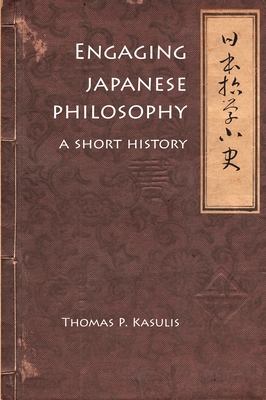Engaging Japanese Philosophy: A Short History

Engaging Japanese Philosophy: A Short History
Philosophy challenges our assumptions--especially when it comes to us from another culture. In exploring Japanese philosophy, a dependable guide is essential. The present volume, written by a renowned authority on the subject, offers readers a historical survey of Japanese thought that is both comprehensive and comprehensible.
Adhering to the Japanese philosophical tradition of highlighting engagement over detachment, Thomas Kasulis invites us to think with, as well as about, the Japanese masters by offering ample examples, innovative analogies, thought experiments, and jargon-free explanations. He assumes little previous knowledge and addresses themes--aesthetics, ethics, the samurai code, politics, among others--not in a vacuum but within the conditions of Japan's cultural and intellectual history. For readers new to Japanese studies, he provides a simplified guide to pronouncing Japanese and a separate discussion of the language and how its syntax, orthography, and linguistic layers can serve the philosophical purposes of a skilled writer and subtle thinker. For those familiar with the Japanese cultural tradition but less so with philosophy, Kasulis clarifies philosophical expressions and problems, Western as well as Japanese, as they arise. Half of the book's chapters are devoted to seven major thinkers who collectively represent the full range of Japan's historical epochs and philosophical traditions: Kūkai, Shinran, Dōgen, Ogyū Sorai, Motoori Norinaga, Nishida Kitarō, and Watsuji Tetsurō. Nuanced details and analyses enable an engaged understanding of Japanese Buddhism, Confucianism, Shintō, and modern academic philosophy. Other chapters supply social and cultural background, including brief discussions of nearly a hundred other philosophical writers. (For additional information, cross references to material in the companion volume Japanese Philosophy: A Sourcebook are included.) In his closing chapter Kasulis reflects on lessons from Japanese philosophy that enhance our understanding of philosophy itself. He reminds us that philosophy in its original sense means loving wisdom, not studying ideas. In that regard, a renewed appreciation of engaged knowing can play a critical role in the revitalization of philosophy in the West as well as the East.PRP: 334.80 Lei
Acesta este Prețul Recomandat de Producător. Prețul de vânzare al produsului este afișat mai jos.
301.32Lei
301.32Lei
334.80 LeiLivrare in 2-4 saptamani
Descrierea produsului
Philosophy challenges our assumptions--especially when it comes to us from another culture. In exploring Japanese philosophy, a dependable guide is essential. The present volume, written by a renowned authority on the subject, offers readers a historical survey of Japanese thought that is both comprehensive and comprehensible.
Adhering to the Japanese philosophical tradition of highlighting engagement over detachment, Thomas Kasulis invites us to think with, as well as about, the Japanese masters by offering ample examples, innovative analogies, thought experiments, and jargon-free explanations. He assumes little previous knowledge and addresses themes--aesthetics, ethics, the samurai code, politics, among others--not in a vacuum but within the conditions of Japan's cultural and intellectual history. For readers new to Japanese studies, he provides a simplified guide to pronouncing Japanese and a separate discussion of the language and how its syntax, orthography, and linguistic layers can serve the philosophical purposes of a skilled writer and subtle thinker. For those familiar with the Japanese cultural tradition but less so with philosophy, Kasulis clarifies philosophical expressions and problems, Western as well as Japanese, as they arise. Half of the book's chapters are devoted to seven major thinkers who collectively represent the full range of Japan's historical epochs and philosophical traditions: Kūkai, Shinran, Dōgen, Ogyū Sorai, Motoori Norinaga, Nishida Kitarō, and Watsuji Tetsurō. Nuanced details and analyses enable an engaged understanding of Japanese Buddhism, Confucianism, Shintō, and modern academic philosophy. Other chapters supply social and cultural background, including brief discussions of nearly a hundred other philosophical writers. (For additional information, cross references to material in the companion volume Japanese Philosophy: A Sourcebook are included.) In his closing chapter Kasulis reflects on lessons from Japanese philosophy that enhance our understanding of philosophy itself. He reminds us that philosophy in its original sense means loving wisdom, not studying ideas. In that regard, a renewed appreciation of engaged knowing can play a critical role in the revitalization of philosophy in the West as well as the East.Detaliile produsului










